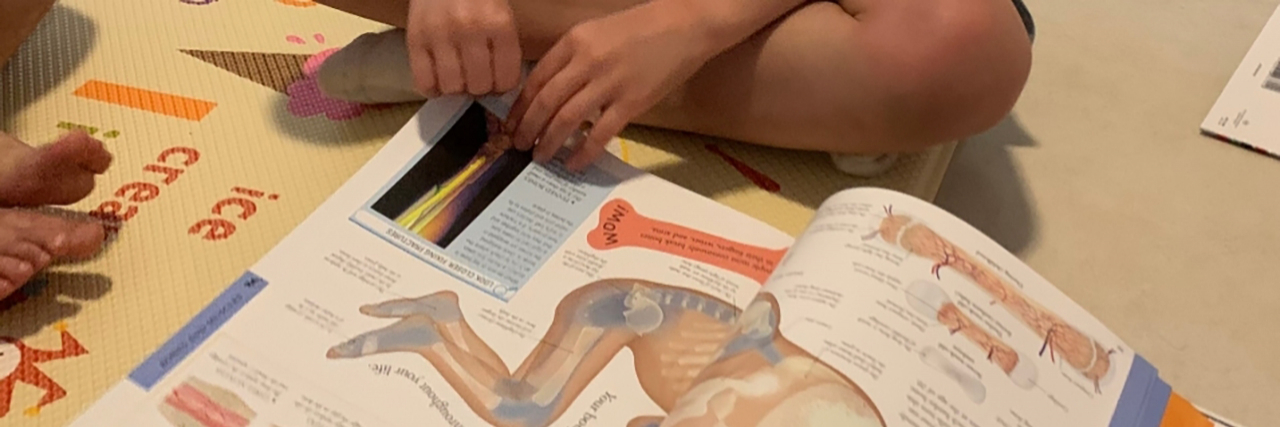My child’s school report sits in my inbox and I tingle with anticipation.
I hope this report will celebrate their successes, and compassionately review areas for development. Hope turns to frustration as I read: “(Child) has enjoyed working with an Education Assistant to engage in the completion of many class tasks. At times (child) can be reliant on the support of the Education Assistant and is encouraged to persevere when challenged.”
The teacher possibly had good intentions, encouraging my child to be independent. However, the comment is unjust. My child has no lack of perseverance. In fact, they work harder than every other child in the class. They show up each day with acceptance and resolve to tackle the sensory overwhelm, ambiguous instructions, and uncertainty of school. I’ve seen this kid’s determination in action — undaunted, they’ll re-write and re-draw a birthday card eight times in a row, until it’s how they want it. I fiercely admire their earnest pursuit. And with their incredible honesty, the idea of asking for help if they didn’t need it would never cross their mind. These are some of my child’s great autistic strengths!
So when my child asks for help from an Education Assistant, it isn’t a sign of over-dependence. It’s self-advocacy. It is because the task is not accessible, or accommodations are lacking. It is not my child’s responsibility to “persevere” without help, it is the responsibility, enshrined in law, of the teacher to provide modifications and support. This will teach my child to be able to ask for necessary accommodations in life. They will know help is available and their needs will be taken seriously.
I email the teacher and the Associate Principal, who coordinates support for disabled students.
Many thanks for the care you put into writing (child)’s school report. I have a request about modifying this comment. I would be grateful if you would consider changing it.
The reason is, if (child) was physically disabled instead of cognitively disabled, for example, if they were a wheelchair user, we wouldn’t write:
“(Child) has enjoyed using a wheelchair to move around the school and access many activities. At times (child) can be reliant on the wheelchair and ramps, and is encouraged to persevere with walking.”
It’s been a spirit-crushing school year for my autistic, ADHDer 7-year-old. They have for the first time internalized stigma about being neurodivergent, telling me “I wish I could be neurotypical.” In the quiet, vulnerable space of bedtime, we lie side by side and talk into the darkness and they say sadly, “I can’t even tell (my teacher) there’s a problem, because it hurts their feelings.” The teacher comments to my child’s Occupational Therapist, “I just think autistic children use these behaviors to get out of doing things they don’t want to do.” I meticulously document and email, politely requesting explanations. The teacher back-pedals – that’s not what they meant, a misunderstanding. We hold meetings, things get better for a while, then go back to misery. I feel quiet, sick unease when dropping off my child at the classroom. I consider pulling them out of school, home education, giving up my job. I dream of the end of this school year. We’ve had some truly wonderful teachers at this school, who have cherished my child’s autistic differences, so I am optimistic things can get better.
I’m not really surprised when this email response arrives from the Associate Principal:
“Hi Sarah, I appreciate your thoughts: the phrase that you have highlighted was previewed by a peer and myself. I can see that you have analyzed it deeply. It was not the intention for this phase to disrespect a diagnosed condition and I did not read it that way.”
Missing the point, really.
I know these teachers aren’t out to be harmful. I know they work so hard for not enough pay. I totally understand the lack of resources for disabled kids. But this comment, and the fact that multiple teachers condoned it, is ableism. So I’m taking a stand.
I will follow my child’s example of determination. I’ll escalate to the School Principal, Department of Education, and the Australian Disability Royal Commission, until we are understood and the report is fixed, or until this story is heard widely. I do believe ableist school reports can end, and one day we will be shocked that comments like this were considered OK. I can’t wait!
This story originally appeared on Neurodivergent Doctor.
Photo provided by contributor.

